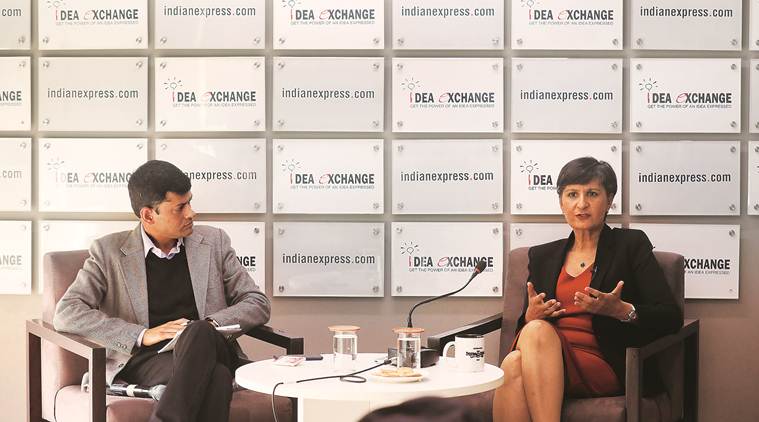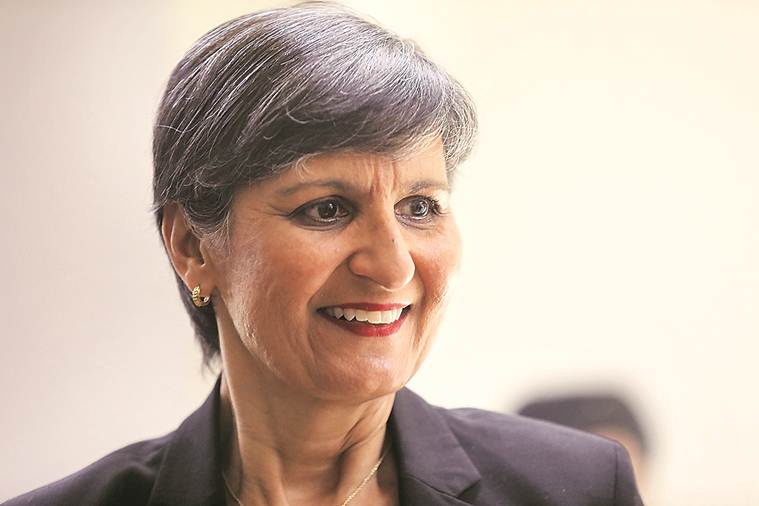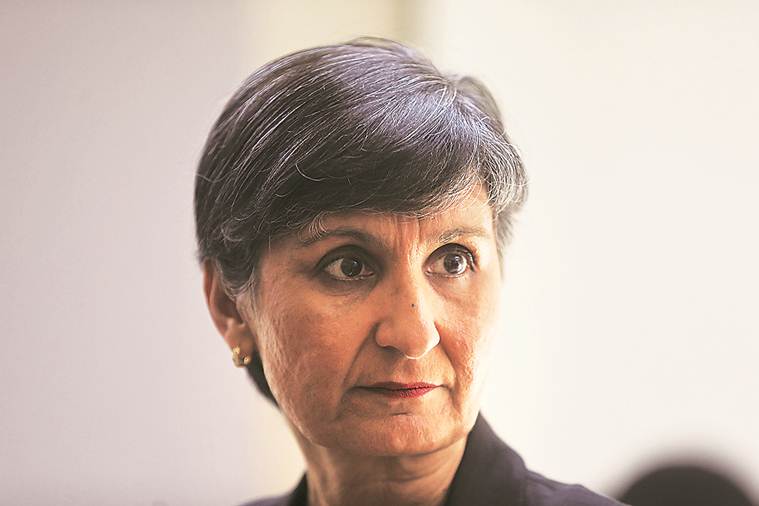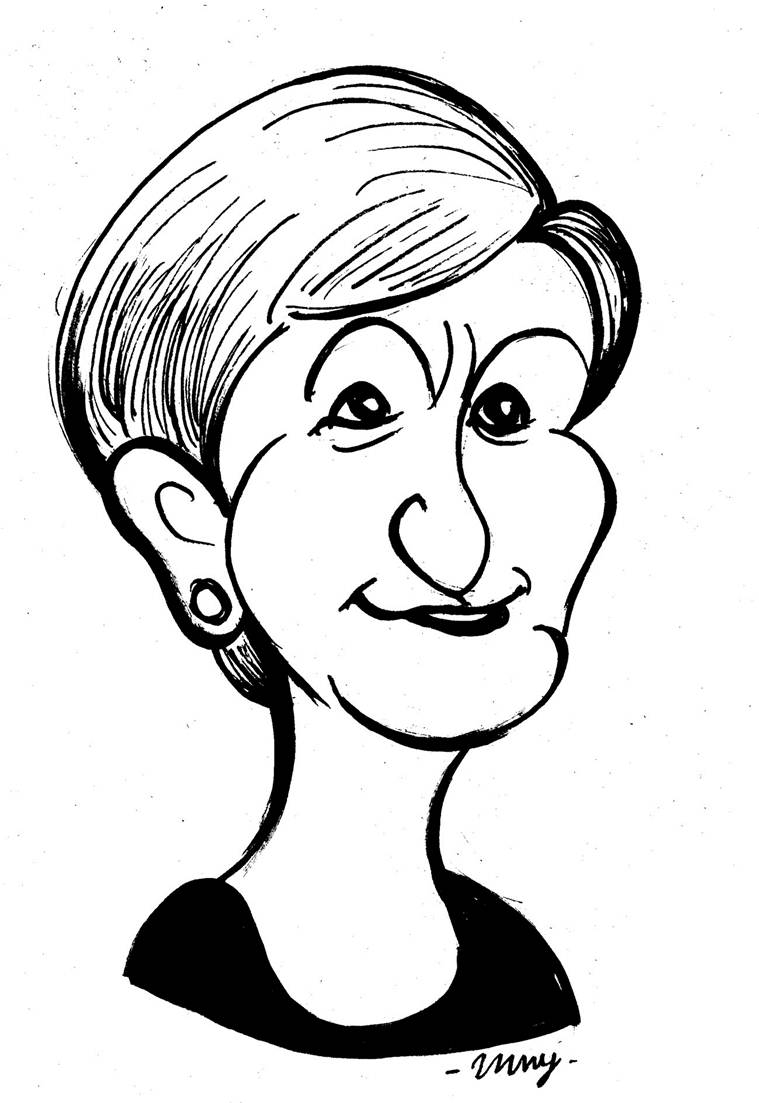 Australian High Commissioner to India Harinder Sidhu with Associate Editor Shubhajit Roy in The Indian Express newsroom. (Express photo by Abhinav Saha)
Australian High Commissioner to India Harinder Sidhu with Associate Editor Shubhajit Roy in The Indian Express newsroom. (Express photo by Abhinav Saha)
Why Harinder Sidhu: Outgoing Australian High Commissioner Harinder Sidhu has been at the centre of the transformation of India-Australia ties in the past four years. Her stint was marked by the revival of the Quadrilateral Security Dialogue (a strategic dialogue involving the two countries, besides USA and Japan) and the visit of President Ram Nath Kovind to Australia, the first-ever by an Indian President to that country. The envoy, who is of Indian descent, was witness to some major developments during her stint in India — demonetisation, the Balakot strikes, abrogation of Article 370 and, more recently, the passing of the Citizenship (Amendment) Act.
SHUBHAJIT ROY: One of the big achievements during your stint was the revival of the Quadrilateral Security Dialogue (Quad). How did it come about?
I think it’s fair to say that the first round of Quad (an informal strategic dialogue among the United States, India, Japan, and Australia) in 2007 was a bit of an unusual beast. We didn’t really do very much in small groups — what we call mini-laterals in diplomacy. By 2017, we were in a very different strategic environment. Not only were we well on the road to articulating what we mean when we say ‘Indo-Pacific’, but already by that stage tri-laterals and small groupings were quite well established. Also, Australia, India and Japan had a tri-lateral that was underway, we were working in two-plus-two formats. So by 2017 it was a natural evolution to accord to a Quad format because the four partners have tri-lateral formations anyway. There is a clear convergence of strategic outlook… I think India went through the same process as Australia and we all came together in November 2017 as you know.
SHUBHAJIT ROY: So is there a realisation that China is a threat, is it the elephant in the room when negotiators or the ministers sit together for discussions?
Quad is a strategic grouping of like-minded countries. The conversations are about humanitarian, disaster relief, counter-terrorism and cyber issues… I think there is a sense that we have an environment where economic power is shifting to the Indo-Pacific, and it’s not just China, it’s many other countries — Vietnam is growing, Bangladesh, India obviously. This creates a strategic flux… I think each of us have our views about China, but the bottom line is that we want China to be a constructive player in the region, and we want to work constructively with China. Also, not just China, but when any country crosses a line or oversteps a mark, we want to be able to say so as well.
SHUBHAJIT ROY: Your Prime Minister was expected to visit India in January, but the trip was cancelled because of the bushfires in Australia. When the visit eventually happens, what are some of the key areas that the two countries are expected to look into?
Visits by prime ministers tend to be great magnets for bringing together a lot of work… In that sense, yes, of course, we have been talking about a logistics agreement for quite some time now. I believe that is one of the things that will really solidify the relationship. Last year, in the defence space, we brought our largest ever deployment for a bilateral naval exercise. India participated in a number of exercises in Australia, and a logistics support agreement just really simplifies all of that. So, certainly, it is my hope that we will be able to conclude that in time but I can’t predict how these things go. We have been working with India in the strategic space as well as on cyber cooperation, counter-terrorism, human trafficking.
LIZ MATHEW: What is your assessment of developments in India in the last four years?
I would say that it’s very dangerous waters for a foreign envoy to wade into, to talk about the internal dynamics of a country, but I remain an optimist on India. I believe that Indian democracy is actually very energetic, very alive. India’s greatest strength is the strength of its democracy and its pluralist society. I think that is what gives this country a great deal of its dynamism. The fact that there is so much debate about government policy or legislation, I think it’s a good thing, a healthy thing, and that’s something I would encourage India to continue to support and evolve.
 Harinder Sidhu: “Kashmir is a bilateral issue… We have credibility in contributing to global peace as we don’t go in and take sides. We do that on invitation of countries… You can’t solve a problem if someone doesn’t want it solved” (Express photo by Abhinav Saha)
Harinder Sidhu: “Kashmir is a bilateral issue… We have credibility in contributing to global peace as we don’t go in and take sides. We do that on invitation of countries… You can’t solve a problem if someone doesn’t want it solved” (Express photo by Abhinav Saha)
LIZ MATHEW: You once said that great democracies always allow for uncomfortable debates. Do you see that happening in India?
I think there is a very strong debate going on on issues that some people find uncomfortable. If that is the test, then I think India is doing very well.
SHUBHAJIT ROY: Do protests against the Citizenship (Amendment) Act, the abrogation of Article 370 in J&K and the Internet shutdown in the state, make it difficult for the Australian government and firms to do business with India?
Our starting point as the Australian government is to respect the sovereignty of every country. In fact, a core element of the way we see the Indo-Pacific idea (is a space) where sovereign countries can behave in a sovereign fashion. We don’t like being lectured by other people, and so we are not inclined to lecture others ourselves. Every businessman or every person will make their own own judgment about how they feel about engaging with India. I think there are two things that give India a lot of weight and credibility in the region, including in Australia, and those things are the strength of its economy and the strength of its democracy. To the extent that those strengths remain, India will continue to be an important partner in the region.
SANDEEP SINGH: The Australian government is willing to go ahead with Gautam Adani’s coal mine project despite protests. How would you justify your decision in the face of criticism from environment groups?
I think that there is a mixing of a few issues, if I may say so. The Adani mine is a very significant investment. We are a country that welcomes investment. It’s a commercial decision made by the Adani Group to invest in Australia, which has been welcomed both at the central and state government level because it generates jobs and improves the economy of that region. I won’t deny that it has been subject to some controversy in Australia. Climate change is a live and sharp debate in Australia. It is not for me to justify or not justify it… but I can justify it in terms of the Australian government continuing to support the investment when it is sound and commercially based. For us to do otherwise would introduce a level of sovereign risk into investment which, frankly, would not be welcome by other investors in the country.
SANDEEP SINGH: What is your view on India’s decision to opt out of the Regional Comprehensive Economic Partnership (RCEP)?
I think it is fair to say that Australia and the other RCEP members were disappointed with India’s announcement at the East Asia Summit last year. Our immediate reaction and the reaction of our Prime Minister, Scott Morrison, was to say that the door is wide open for India to rejoin and that remains our priority. We genuinely hope that India will rejoin the RCEP. The issues and concerns that India has are something we should continue to address and seek to negotiate… We recognise that this has not been an easy road for India to go on. India has, in some sense, been catching up with the other countries in the region, but we really credit the Indian system for having invested the time and effort in engaging with the RCEP right up to that point… (The RCEP) is actually about regional economic integration. It is about bringing the big players of the Indo-Pacific together, economically and not just strategically. India adds weight, it brings balance to the RCEP equation. And, equally, what the RCEP offers India is accelerated access to 15 of the most dynamic economies in the world. There would be benefits to India as well by joining the RCEP in terms of its ability to access those economies and strengthen its economy in the process… India’s government has said that it will keep the door a little bit ajar and consider it, and whenever India is ready, I think we are quite happy to work with India and welcome it back.
 Harinder Sidhu: “Each of us has our views about China, but the bottom line is we want it to be a constructive player in the region. Also, not just China, but if any country crosses a line or oversteps, we want to be able to say so” (Express photo by Abhinav Saha)
Harinder Sidhu: “Each of us has our views about China, but the bottom line is we want it to be a constructive player in the region. Also, not just China, but if any country crosses a line or oversteps, we want to be able to say so” (Express photo by Abhinav Saha)
SHUBHAJIT ROY: Did you see a high level of interest by the political leadership in India in the Adani investment?
This was always seen by both countries as a commercial investment made by a private company in Australia. The government interaction on the Australian side related to regulatory approvals, as it is when Australians invest in India. So the engagement was only in that context.
SHUBHAJIT ROY: The Indian economy has not been performing very well. Has it had any impact on Australia’s engagement with India?
…Our understanding is that the economies go up and down in cycles. The trick is to always look at the trend line… Even if you look at the IMF’s (International Monetary Fund) latest outlook, the trend line for India still remains strongly positive. That is because the economic fundamentals in India are sound. That said, what will effect the speed and the shape of that trend line will be specific policy decisions that are made, or specific events that might occur, so those are the things that we watch… India, I think, has an opportunity to really shape its economy, to reform it, and in the future get an economy that is strong and resilient. It is good to see that the government has taken strong steps in this respect. Ease of doing business is a real thing. There is progress, there is scope, and it has actually come a long way. We are seeing more interest by Australian businesses in India.
MUZAMIL JALEEL: We have seen many countries send Indian-origin diplomats to India. In terms of diplomacy, has it helped you?
It has been a help. I don’t think it is very easy to define why it has been so useful. At some level, an ability to interpret both sides, both perspectives, is a bit easier if you understand the culture deeply. (But) there may be ambassadors of Indian origin who may not do that so well. I think it also goes down to core diplomatic skills, the ability to look at the country, to look at events, through the eyes of the people of the country. It’s certainly a lot easier if you have the language, you are addicted to Bollywood movies as I am… Of all the places that I have been to, I have found (India) to be a very comfortable place to work in. That would have had something to do with my origins.
KARISHMA MEHROTRA: Australia’s decision to ban Chinese smartphone maker Huawei from providing 5G technology for the country’s wireless networks split the developed world. How did you decide on it?
It was a technical assessment that we made about how to secure our 5G network. We were the first country to really take up this question because our telecommunication companies asked us to have a look at it. So we undertook a technical assessment and formed a view that, to be able to secure our 5G network, we needed to ensure that all the vendors were distant from any government or any other power. That’s not aimed at Huawei or any other company in particular. It’s a judgment about the distance between commercial provision of an equipment or whatever and the ability of another government or power to interfere. So we made that judgment entirely on technical grounds. We made it in the context of our own sovereign concerns.
KARISHMA MEHROTRA: What would your response be to the criticism that there is not enough political will from your country to fight climate change, especially in light of the bushfires which could be a consequence of it?
The bushfires have been quite unprecedented in our country this year, and our government has worked very hard to respond. We are very sure that the recovery will happen very swiftly. Our Prime Minister has been very open in saying that definitely climate change is a factor in these fires. It is something I think that bears more examination. Despite all the noise and controversy around climate change in Australia, it has always been a very controversial topic. The fact is that since 2006-07, every government in Australia, of every political colour, has had a climate change policy and emissions reduction policy in place, as does the current government. So it is something I am sure will be considered down the track as we review these issues. But be in no doubt that we are very conscious of the climate aspect to these bushfires as well.
SANDEEP SINGH: You spoke about how opening up of the economy has helped both India and Australia. But we are increasingly moving towards a scenario where many countries are turning inwards, tariffs are being imposed. How do you see this impacting global trade and growth?
The backbone of Australia’s success has been the liberalisation of our economy… In the past when the world did go down the path of raising tariff walls, it led to slower growth globally anyway. This isn’t just an ideological position, it is objectively something that makes a lot of sense.
 Harinder Sidhu: “The Adani mine is a very significant investment. We welcome investment. It’s a commercial decision made by Adani Group to invest in Australia, which has been welcomed both at central and state level because it generates jobs”
Harinder Sidhu: “The Adani mine is a very significant investment. We welcome investment. It’s a commercial decision made by Adani Group to invest in Australia, which has been welcomed both at central and state level because it generates jobs”
MUZAMIL JALEEL: Was Australia invited to be part of the tour of foreign envoys to Kashmir?
I think every ambassador made a choice about going on that tour. I don’t want to comment about that.
MUZAMIL JALEEL: Australia supported the grey-listing of Pakistan by the Financial Action Task Force (FATF). Also, your relationship with India is much stronger than it is with Pakistan, and if India was taking envoys to Kashmir, Australia would be invited…
I wouldn’t draw that link. We have always been of the view that Kashmir is a bilateral issue for India and Pakistan to resolve… The FATF is a technical group, and they make technical judgments about whether a country is meeting the requirements or not. We have landed on a technical judgment that the grey-listing continues to be justified. I think October was the last meeting. So we are now in the process of discussing if there has been any progress made by Pakistan towards meeting some of those requirements.
RAVISH TIWARI: Why has Australia not taken a position on J&K or the CAA?
…We have credibility in contributing to global peace and security because we are not seen as a country that goes in and takes one side or the other. We do that at the invitation of countries… That is a very important part of the puzzle — you can’t solve a problem if someone doesn’t want a problem solved.
SHUBHAJIT ROY: There were many people from Australia who joined the ISIS. Has Australia managed to find the motivation behind it?
Since 2001, since 9/11, it has certainly been on our radar, this whole question about political Islam and radicalisation. Australia has been very concerned about the number of people who went from the country to the Middle East to fight with the ISIS. We have worked very hard to counter radicalisation, and large part of that was working with the Islamic communities in Australia. But one thing that we have been learning as we have gone along is that it’s actually impossible to predict the path that leads someone to radicalisation. We know that working with the communities has been helpful. We know that watching social media behaviour can also be helpful, but not perfect… India has a very small number of such people, and we look at that with admiration. We are trying to understand what it is that is different in India to what has happened in Australia, to try to see if there are things that we can learn from India.
SHUBHAJIT ROY: In your four years in India, what do you count among your biggest achievements, and has there been a low point?
It’s very difficult for me to point to one single achievement but I would say the overall step change in the relationship has been the big achievement… My achievements have been not just about India, but also in Australia. Australia has also begun to take India very seriously as a partner. And the fact that it has been mutual, has been a phenomenal achievement.
For me, the RCEP has been a disappointment. I maintain hope that India will reconsider.